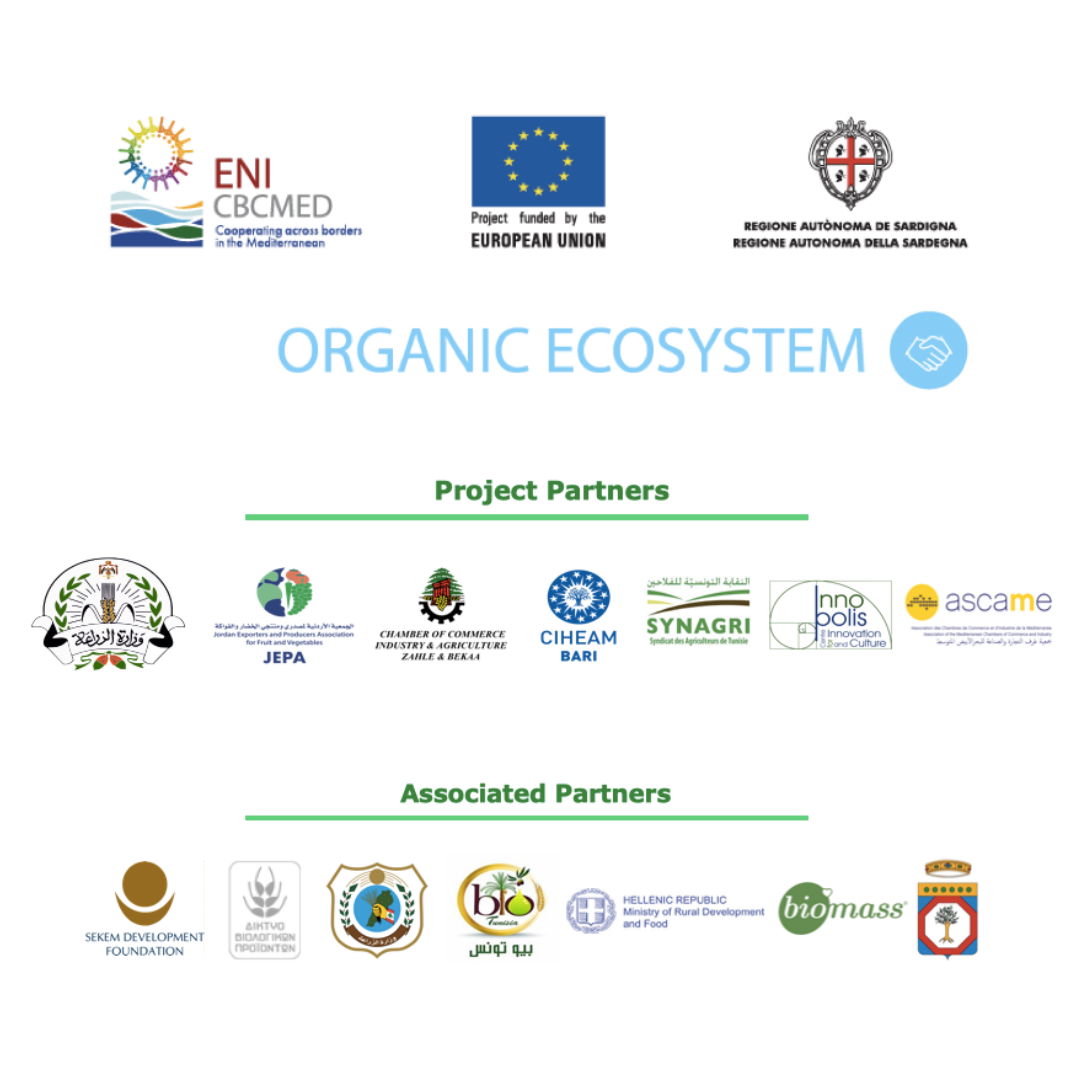Les partanaires associés en soutien au projet ORGANIC ECOSYSTEM

Contenu disponible uniquement en anglais.
Associated Partners (AP) play an essential role in ORGANIC ECOSYSTEM. They are experts in their fields and major team players in the MED Organic and Agro scenario.
They contribute to the project bringing their know-how to the table, facilitating meetings and connections, and escalating cross-border cooperation among stakeholders and target groups.
Without their support and collaboration, the reach of the project will be much lower than having them by our side. They strengthen, amplify, and escalate the project reach and stakeholders engagement.
(*) Please note that the correct website for the chamber of commerce, industry and agriculture of Zahle and the Bekaa (CCIAZ) is: http://www.cciaz.org.lb/
- SEKEM Development Foundation | EGYPT
-
The SEKEM Development Foundation is a private non-profit organization founded in 1984 and registered as an NGO with the Ministry of Social Affairs. The Foundation works on improving the quality of people's lives and living conditions. In addition to this, SDF holds courses in the arts, personal development, as well as practical subjects. These core concepts were incorporated into the SEKEM Schools Initiative, in order to develop Egypt’s youth towards adopting a more sustainable future.
Over the last two decades, the foundation has expanded its program of activities from initial basic educational initiatives and it now implements a variety of projects and programs in the field of social development, health care, education and ecology.
Its role is to contribute to developing the organic sector in Egypt and improving the quality of people's lives and living conditions.
More info: www.sekem.com
- Organic Products Cluster | GREECE
-
Organic Products Cluster (OPC) is a nonprofit, nationwide organization that has been set up by the Federation of Industries of Northern Greece (F.I.N.G.) on March of 2006. OPC is an organization with a vertically integrated structure, which supports all actors involved to the supply and marketing chain of the organic sector. Furthermore, OPC provides supporting tools and information services for the promotion of the organic products to enterprises and consumers.
The main objective of OPC is to constitute a development organization for mapping out strategies, promoting Greek organic products and supporting organic producers through recommendations and strategic interventions at different levels.
More info: https://www.biocluster.gr/web/guest/home
- Lebanese Ministry of Agriculture | LEBANON
-
The Lebanese Ministry of Agriculture (MoA) is the Government institution responsible for setting the agriculture strategic framework, formulating and implementing policies/programs for the development of the sector in Lebanon.
MoA is responsible for developing a suitable legal and regulatory framework, and enhancing infrastructure development to promote investment and improve agricultural production and marketing.
MoA also plays an important role in the management of natural resources of the country (agricultural land, irrigation water, forests, fisheries, pasturelands) and contributes to rural development programs.
MoA is the competent authority regulating the organic agriculture sector in Lebanon, through the Organic Technical Committee which is responsible for regulating and monitoring the sector.
MoA is an associate partner in the Organic Ecosystem project.
More info:
Website: www.agriculture.gov.lb
Twitter: @MoALebanon
Facebook: Lebanese Ministry of Agriculture – وزارة الزراعة اللبنانية
Youtube Channel: Lebanese Ministry of Agriculture
- Tunisian Ministry of Agriculture | TUNISIA
-
The DGAB, created in 2010, is the last structure born in the organic agriculture sector in Tunisia since the creation of the sector in 1999 (law 30-1999). The DGAB ensures the governance of the organic agriculture sector in Tunisia. It develops and implements the policies and strategies of the sector, in close collaboration with the various operators and stakeholders concerned.
It is in charge, among other things, of the training of trainers and organic operators (supervision and apprenticeship), promotion of the sector, studies and extension, support to operators and to projects and investments in the sector. It provides a watch and a single-window (local and national) for the guidance and facilitation of the marketing of organic products.
The DGAB is the competent authority for the control of organic products in Tunisia and is in charge of supervising control and certification bodies. It holds the database of the sector and is in charge of the traceability of organic products (the management of the organic label) in order to ensure the credibility of the sector.
The DGAB ensures international cooperation and represents the Ministry in the relevant international bodies and organizations.
- BIOMASS | LEBANON
-
Biomass is a grower, processor and distributor of organic certified products in Lebanon. Established in 2007 as a privately owned company, Biomass works today with more than 50 organic-certified partners (farmers) in Lebanon, offering 200+ certified organic products, to end consumers in Lebanon and the Middle-East Region.
Biomass is an importer and exporter of organic products, with a presence in 7 countries and a portfolio spanning 4 product categories. These are Organic Fresh Fruits & Vegetables and Organic Chicken Eggs to Organic Grocery Products and Organic Meat.
On the Organic Ecosystem project and as an associated partner, Biomass will be working with ASCAME on the communication streams.
More info:
Website: www.biomasslb.com
Instagram: @biomassorganic
Facebook: @biomassorganic
- Greek Ministry of Agriculture | GREECE
-
The Ministry of Rural Development and Food works in collaboration with farmers and other stakeholders with a view to promoting sustainable agriculture, food safety and security, the viability of the sector, and the prosperity of rural areas in Greece. The ever-changing international environment affects our policy-making and strategy for agriculture and rural development, taking into account the competitiveness of our products and the restructuring of the countryside.
Τhese driving forces set the framework within which the Ministry of Rural Development and Food makes policies and systematically seeks to make the best possible use of all available financial tools.
More info: www.minagric.gr
- Apulia Region | ITALY
-
More info: https://regione.puglia.it/
JOIN US!
Instagram - LinkedIn - Twitter - Facebook - LinkedIn Professional Group







